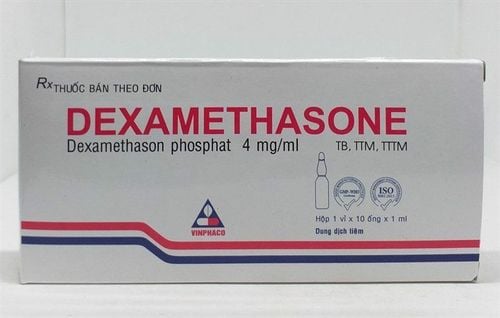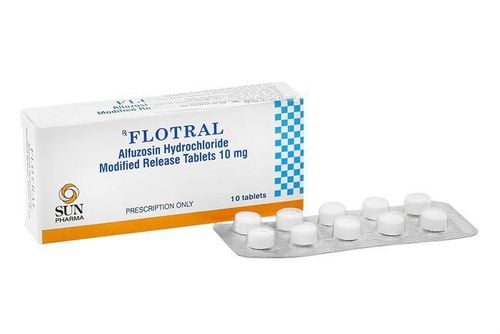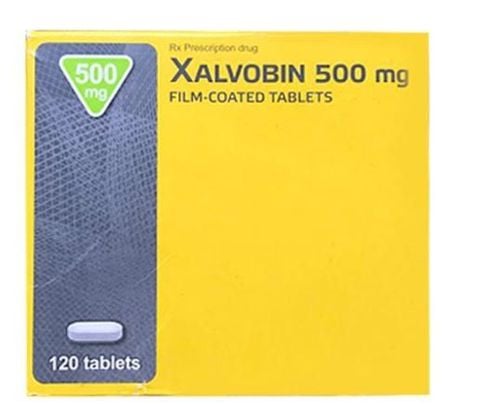This is an automatically translated article.
Oxarich is a drug that is effective in the adjuvant treatment of people with cancer of the gastrointestinal tract, including colorectal cancer. This drug should be used under the direction and supervision of a physician experienced in the use of cytotoxic drugs.1. What does Oxarich do?
Oxarich medicine has the active ingredient Oxaliplatin 50mg, prepared in powder form for injection.
Oxaliplatin is an antineoplastic drug belonging to the group of alkylating drugs. After entering the body, oxaliplatin binds to the guanine and cytosine units of DNA selectively, resulting in DNA cross-linking, thereby inhibiting DNA synthesis and transcription, inhibiting cell proliferation. growth of cancer cells.
In studies, this drug has antitumor activity on many types of tumors including colorectal tumors.
2. Indications and contraindications of the drug Oxarich
Indications: Oxarich is used in the following cases:
Combination therapy with other drugs as an adjuvant therapy in stage III colon cancer in patients undergoing radical surgery. Treatment of late or advanced colorectal cancer: Use in combination with other drugs to treat late colorectal cancer without previous drug therapy or surgery; Contraindications: Do not use Oxarich for the following cases:
Hypersensitivity to the main active ingredient oxaliplatin, other platinum derivatives or any of its ingredients. People who are pregnant, or breastfeeding. Severe renal impairment (when creatinine clearance < 30 ml/min).
3. Dosage and Administration Of Oxarich
3.1. Administration Oxarich Oxtapin is administered intravenously over a 2-hour period. Avoid direct contact with the drug during the preparation process. If the drug solution comes into contact with the skin or in contact with the mucous membranes, wash the skin with soap and water, wash the mucous membranes with plenty of clean water. Do not dilute this medication with NaCl or other chlorine-containing solutions. The oxaliplatin solution is diluted in a 5% glucose solution to a volume of 250 - 500 ml. After dilution, the shelf life of the solution is 6 hours at room temperature (20 - 25°C) or 24 hours if stored in the refrigerator (2 - 8°C). Do not use needles or avoid contact with aluminum components while preparing or mixing drugs for infusion. Aluminum has been reported to cause degradation of platinum compounds. Do not mix with other drugs, when using other drugs you need to cover the infusion line with 5% glucose solution. 3.2. Oxarich Dosage Adults Usual Dose: Use the usual dose of oxaliplatin 85mg/m2, once every 2 weeks. Sometimes it is necessary to change the dose or infusion time: At the end of each drug cycle, the patient should be evaluated for toxicity, and then change the dose and infusion time accordingly. Increase the duration of oxaliplatin infusion from 2 hours to 6 hours to limit some acute toxicity; Children: This medicine is not recommended for use in children. Renal Impairment: No dose adjustment is recommended in patients with mild or moderate renal impairment. Careful monitoring is required while taking the drug. Hepatic impairment: No dosage adjustment is required for patients with hepatic impairment. Elderly: No dose adjustment is required for elderly patients (over 65 years). But you need to pay close attention when using.
4. Undesirable effects of the drug Oxarich
When using Oxarich you may encounter the following undesirable effects:
Common side effects:
Fatigue, body aches, fever, headache, insomnia, dizziness, nausea and vomiting , diarrhea or constipation, abdominal pain; Anorexia, pharyngitis, oral mucositis, dyspepsia, taste disturbance, flatulence. Gastritis, gastroesophageal reflux disease, difficulty swallowing. Anemia, decreased platelet count, decreased white blood cell count, decreased neutrophil count, increased AST and ALT enzymes, increased total bilirubin. Peripheral neuropathy, myalgia, back pain, arthralgia, cramps. Shortness of breath, cough, frequent upper respiratory tract infections, rhinitis, nosebleeds, nasopharyngitis, sensory disturbances in the oropharynx. Edema, chest pain, peripheral edema, thromboembolism, decreased serum potassium index, difficulty urinating. Tear disorders, increased serum creatinine, injection site reactions, allergic reactions, hypersensitivity, hiccups. Uncommon side effects: Acute renal failure, increased alkaline phosphatase, rhabdomyolysis, anaphylactic reactions, anaphylaxis.
Rare:
Thrombocytopenia due to immunoallergic reactions, hemolytic anemia, rapidly decreasing visual acuity, visual loss, optic neuritis, transient vision loss. These reactions are usually reversible upon discontinuation of treatment. Infectious colitis including Clostridium difficile diarrhea, pancreatitis. Interstitial lung disease, pulmonary fibrosis, hearing loss, and posterior cerebrospinal syndrome are usually reversible. During treatment with this medicine, if you notice any of the above side effects or any other unusual signs, you should tell your doctor about any unusual signs for advice and appropriate treatment.
5. Notes and cautions when using Oxarich
Use gloves, a mask or use safety glasses to ensure safety when handling the drug. Oxaliplatin is an anti-cancer and cytotoxic drug that should be prescribed by a specialist, experienced in drug use and under close supervision when used. Treatment with oxaliplatin often causes peripheral sensory neuropathy. The duration and severity of this disorder increased with dose. Symptoms include transient paresthesias, sensory disturbances, paresthesias in the hands, feet, perioral area or throat; Jaw spasticity, taste dysfunction, language disturbances, eye pain, and a feeling of heaviness in the chest have also been reported. These symptoms are often aggravated by exposure to low temperatures or cold objects. Therefore, sick people need to avoid cold foods and drinks, avoid exposure to low temperatures, and wear gloves when handling cold objects. Severe neutropenia: Grades 3 and 4 leukopenia have occurred in colorectal cancer patients treated with oxaliplatin. Sepsis and septic shock due to leukopenia have been observed in patients, including fatal. Stop oxaliplatin until neutrophils reach >1.5 x 10/L. Reduce oxaliplatin dose after grade 4 neutropenia or neutropenia with fever but improvement with treatment. Rhabdomyolysis: Rhabdomyolysis, which includes fatal cases, has been observed in patients treated with oxaliplatin. Discontinue oxaliplatin if signs or symptoms of rhabdomyolysis occur. During the infusion of oxaliplatin, cold compresses should not be used to prevent mucositis, because of the exacerbation of neurological disorders. Your doctor may prescribe an extension of the infusion time to help reduce the incidence of dysesthesia in the pharynx, pharynx, and larynx. This medicine may cause pulmonary fibrosis. If unexplained respiratory symptoms such as dry cough, dyspnoea, or pulmonary infiltrates are observed on chest X-ray, the drug should be withheld until pulmonary fibrosis is eliminated. Before each cycle of oxaliplatin treatment you need to have liver function tests. This drug can cause hepatotoxicity, signs such as increased liver enzymes, hyperbilirubinemia,...have been reported. During continuous, prolonged infusion, taxane derivatives (docetaxel, paclitaxel) should be used before platinum derivatives (carboplatin, cisplatin, oxaliplatin) to minimize the risk of myelosuppression and increase efficacy. . Concomitant use of the active ingredient Oxaliplatin with 5-fluorouracil can often increase the risk of undesirable effects on the liver and gastrointestinal tract, when using the drug should pay attention to the effects on the gastrointestinal tract. Elderly patients, especially those over 88 years of age, are more susceptible to some of the undesirable effects of Oxarich, including diarrhea, dehydration, hypokalemia, myelosuppression causing leukopenia, fatigue or sometimes faint. Pregnancy: Risk rating D. Oxaliplatin is not recommended during pregnancy and even in women of childbearing potential who are not using effective contraception. The use of oxaliplatin should only be considered after the patient has been appropriately evaluated for the risk to the fetus and informed by the patient. Women of childbearing age taking this medicine should use effective birth control while taking this medicine. You should consult your obstetrician if you are unsure about effective birth control methods. Caution for use in nursing women: It is not known whether oxaliplatin is distributed into breast milk. Breastfeeding should be discontinued during drug treatment. Abnormalities of vision, especially transient loss of vision, can affect the patient's ability to drive and use machines. Therefore, attention should be paid to the effects of the drug when driving or using machines.
6. Drug interactions
Interactions of Oxarich with other drugs include:
Oxaliplatin can increase the concentration or increase the effect of natalizumab, live vaccines reduce the dynamics, making patients more susceptible to infections after injection. The combination of cytotoxic drugs (including oxaliplatin) with clozapine should be avoided because of the increased risk of agranulocytosis. The use of oxaliplatin regimens in combination with fluorouracil and leucovorin concomitantly with drugs with anticoagulant effects because of the potential for prolongation of prothrombin time and an increase in INR. Increased risk of serious bleeding. Co-administration of oxaliplatin with drugs including aminoglycosides, polymyxins, capreomycin, diuretics may increase the risk of nephrotoxicity and ototoxicity. Trastuzumab may increase the concentration and effect of oxaliplatin. Echinacea may decrease the concentration and effect of oxaliplatin. Oxaliplatin is incompatible with solutions and alkaline drugs (e.g. fluorouracil) and should never be mixed or given into the same intravenous line with oxaliplatin. Because, alkaline solution will adversely affect the stability of oxaliplatin. Storage: Oxarich vials are stored at room temperature (15 - 30 degrees Celsius), do not freeze medicine.
Oxarich drug is used in the treatment of cancer, is considered a cytotoxic drug. When used there is a risk of many side effects, so if there is an abnormality during treatment, you need to immediately tell your doctor for advice and appropriate adjuvant treatment.













